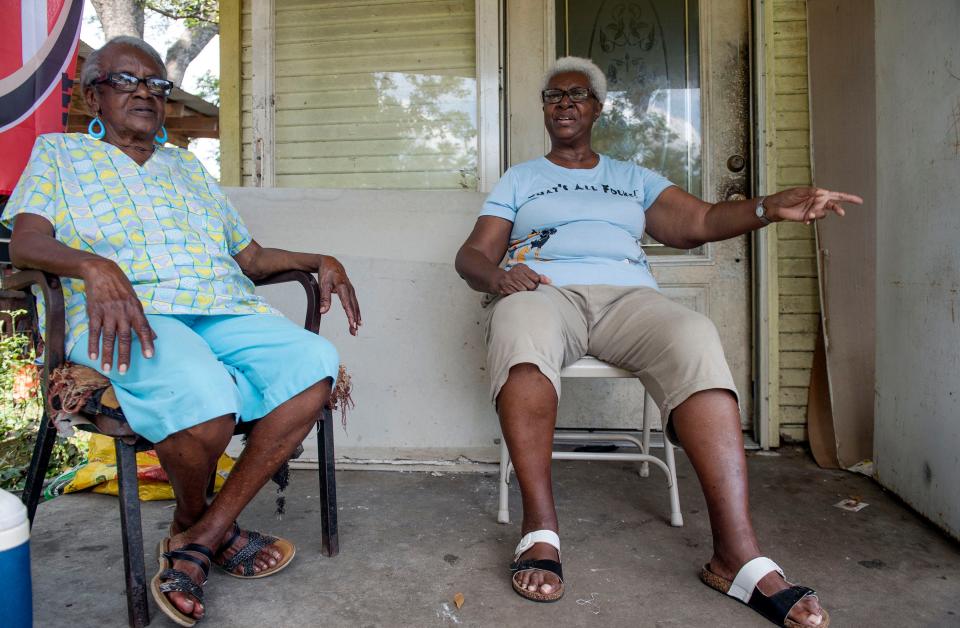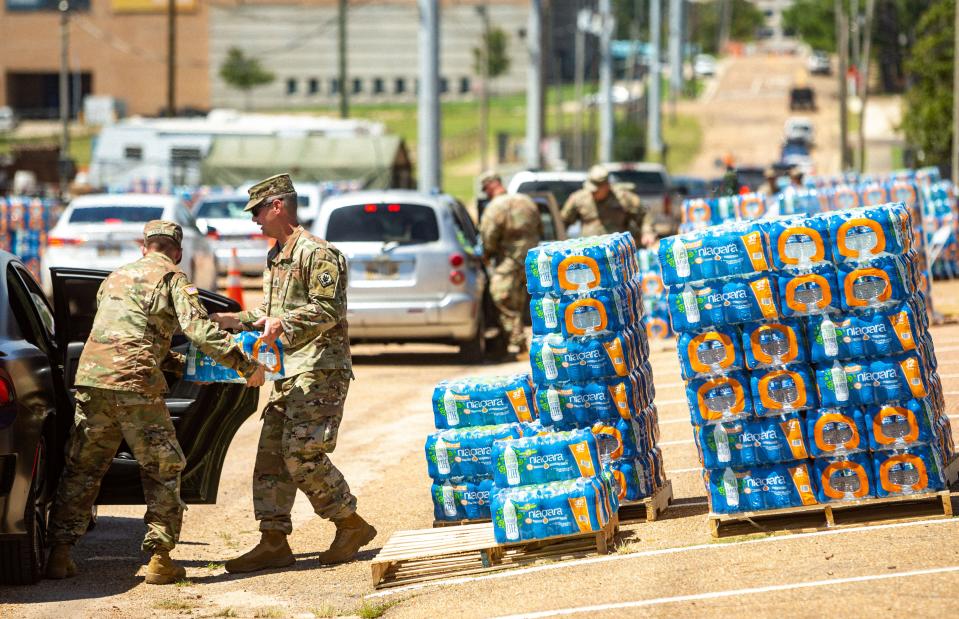How the Clarion Ledger covered the Jackson Water Crisis
- Oops!Something went wrong.Please try again later.
At 1 p.m. Thursday, Sept. 15, Mississippi Gov. Tate Reeves announced water in the state’s capital city of Jackson was again safe to drink.
At the same press conference, Reeves drank water from a disposable plastic water bottle.
For 48 days, Jackson’s 151,000 residents, along with residents of neighboring communities that rely on Jackson utilities, had been under a boil-water notice, left without reliable drinking water.

Restaurants shuttered. Businesses struggled to adapt; some considered moving to suburban areas where water, the most basic of human needs, was clear and consistent.
At times, pressure in the city’s water system was so low that the city’s mostly Black, often poor, residents could not even shower amid a relentless Mississippi summer, as no water pressure was available for such things, including occasionally not being able to flush a toilet.
"The United States is the greatest country in the world, but Jackson is not the greatest place," said Nelson Fiallos, a Jackson homeowner since 2013, reflecting the sentiment of many Jackson residents during the city’s latest water crisis.

Jackson’s water problems are not new. The beleaguered water system had been teetering for decades before the most recent crisis in the fall of 2022. Jackson had been under boil-water notices dozens of times over the years and even earlier that summer.
So when the city announced another citywide boil order on July 30 due to turbidity in the water, many residents shrugged their shoulders with a here-it-goes-again attitude. This time, though, the water system could not easily be patched. After Pearl River flood waters intruded the water system on Aug. 29, the system foundered, and the Clarion Ledger accelerated its exploration of the failure’s devastating impact on the community that relies on the system for water.
How did Mississippi’s capital city end up in such a mess? It turns out, the water system’s problems stem from a century of poor decisions, compounded by racism and neglect.
Jackson’s residents have often felt betrayed by city and state officials regarding the city’s ongoing water system problems and failures in the past. This time, when the water was finally cleared to drink on Sept. 15, many residents had little trust for any statement coming from politicians. At one point, Jackson Mayor Chokwe Antar Lumumba declared the city had tested the city’s water for lead and revealed that fewer than 16 out of 24,000 connections had tested positive for lead in water.
In an effort to hold public officials accountable, the Clarion Ledger partnered with the Mississippi Center for Investigative Reporting and, at the Clarion Ledger’s sole expense, tested water connections throughout the city using an independent third-party laboratory. What testing revealed, albeit in a far more limited scale than what the city had announced, was that elevated lead results could be far more widespread than the city had reported. Experts say no amount of lead in water is safe to consume.
The Clarion Ledger also tested for bacteria in water, immediately after the Sept. 15 all-clear notice from the governor, helping reassure residents that, from a bacterial standpoint, the water was safe to consume.
Throughout the fall, the Clarion Ledger, buoyed by regional help, dissected the City of Jackson’s water system problems from a variety of angles, exploring:
The impact on race in a city that is 83% people of color;
The environmental impact, with millions of plastic water bottles that had been distributed to residents in need being discarded in a city that has no recycling program, and offering tips on how to manage proper disposal;
How much more can Jackson withstand? One family sent their children to Honduras to avoid the third-world conditions in Jackson.
The human toll, through the lens of residents along one hard-hit street;
The challenges in repairing the broken system, including undertrained and mismanaged staffing.
“Not enough money, natural age and loss of skilled people,” one former Jackson water system manager said. “You put that together, and anything's going to fail.”
The Clarion Ledger Audience Team was hard at work throughout the city’s water crisis, telling the story in different ways, building special presentations and a strong social-media presence. The Clarion Ledger was the only Jackson media present when the Gov. Reeves went to Hattiesburg and made what became an infamous statement that it was “a great day to not be in Jackson” and captured that on video.
Many Jackson residents considered Gov. Reeves’ pronouncement to be tone deaf, and some grew tired of his constant sparring with Jackson Mayor Lumumba, at one point, publicly calling the mayor “incompetent.”
Meanwhile, people altered their lives to line up for cases of water, sometimes to be turned away, even when they were doing the right thing trying to help elderly neighbors who could not leave their homes.
“I actually cried,” said Jackson resident Evelyn Ford. “Things are already bad enough for us as it is”
While the citywide boil-water notice was lifted Sept. 15, the city’s water woes were far from over. The brittle system suffered dozens of minor breakdowns before collapsing again on Christmas Day, plummeting the city into widespread water system issues that would last into the new year.
By then, some reason for hope emerged. The city had relented to state and federal demands that a third-party administrator be appointed to operate the system and they received someone with experience in such tattered infrastructure.
In December, came news that the federal government had appropriated $600 million to fix Jackson water. That number, while significant for Jackson, may fall well short of estimates that range as high as $2 billion to fix the O.B. Curtis surface water treatment plant and miles of decaying pipes.
Jackson citizens were curious throughout the process, and the Clarion Ledger was there to answer their questions.

This article originally appeared on Mississippi Clarion Ledger: How the Clarion Ledger covered the Jackson Water Crisis

